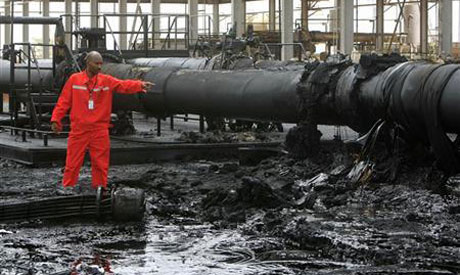
Sudanese engineer points at the damage to a pipeline at the largely damaged oilfield in Heglig (Photo: Reuters)
Sudan's dispute with its southern neighbour over oil transit fees has created a 6.5 billion pound gap in the country's public finances and caused exports to plunge 83 per cent, the Sudanese finance minister said on Monday.
South Sudan inherited three-quarters of oil production when it gained independence from the North last July.
But the pipelines are in Sudan and the two have been unable to agree on how much the South should pay to transport its oil, with the row escalating into a low-level armed conflict in recent weeks.
After several rounds of failed talks to resolve that dispute as well as conflict over border demarcation and citizenship, there have been fears that full-scale war could break out in one of Africa's most significant oil regions.
Fighting has eased since Wednesday, when the U.N. Security Council threatened both sides with sanctions unless they resumed talks within two weeks.
The row caused South Sudan to shut off 350,000 barrels per day (bpd) of crude output in January and the South's temporary seizure of a contested oilfield last month shut down nearly half of Sudan's 115,000 bpd output.
Sudan's oil minister has since said the Heglig oilfield is pumping oil again, without specifying production amounts.
Both countries' economies have been crippled by the absence of oil revenues.
"Not reaching a deal with the government of the South over transit fees and petroleum servicing has caused a gap in the public financial sector worth about 6.5 billion Sudanese pounds," Finance Minister Ali Mahmoud told lawmakers in an address on economic performance in the first quarter of 2012.
"Regarding exports, the first quarter of 2012 saw an 83 per cent decline compared to the first quarter of 2011, and this happened because of the absence of oil."
Oil represents 90 per cent of all Sudan's exports.
Mahmoud also said inflation in the first quarter rose to 21 per cent from 12.9 per cent in the same period last year.
Short link: